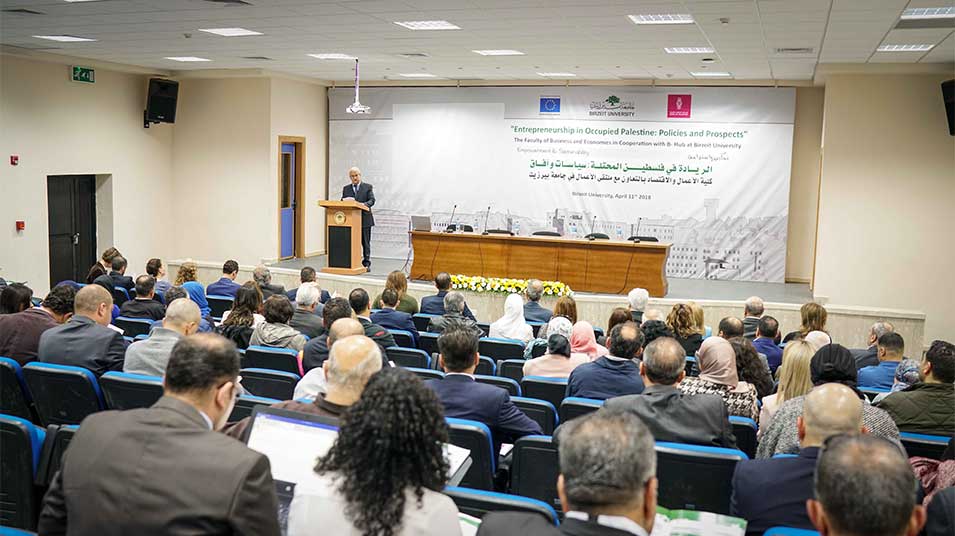Entrepreneurship in Occupied Palestine: Policies and Prospects
Trade and industry experts, entrepreneurs, and academics explored the realities, challenges, and opportunities of entrepreneurship in Palestine in a conference entitled “Entrepreneurship in Occupied Palestine: Policies and Prospects,” held on Birzeit University’s campus on April 11, 2018.
The conference, organized by the Faculty of Business and Economics and the B-Hub at Birzeit University and sponsored by the European Commission and Bank of Palestine, brought together various industry leaders, young and experienced entrepreneurs, and business and economics professors and academic experts to shed light on the theories and praxis of entrepreneurship in the occupied Palestinian territories.
Two main themes constituted the program of the conference: social/green and cultural entrepreneurship; and the importance, challenges, and outcomes of women entrepreneurship.
President of Birzeit University Dr. Abdullatif Abuhijleh said that the conference is part of the university’s responsibility to support Palestinian liberation from the “last occupation in the modern human history.”
As part of its 2017 – 2022 strategy, Birzeit University continues to transform itself into an entrepreneurial university, Abuhijleh added. “We’ve started adopting an organizational structure that further bolsters this transformation by establishing new units and modernizing the job description of all new and existent units, in addition to putting in place detailed action plans that will help us achieve our vision of becoming an entrepreneurial institution in all of its components that contributes to knowledge production, both nationally and internationally.”
“Birzeit University strives to strengthen the components of national sustainable development and localize entrepreneurship and innovation on all levels, as well as maintain leadership in all facets so as to fulfill its duty as a place where innovation and entrepreneurship flourish. The university also endeavors to provide empowerment and foster partnerships with centers of innovation and excellence at Palestinian universities and private sector institutions by creating an atmosphere that encourages innovation and inspires academics and professors to develop pedagogical and research methodologies and practices that can be found more relevant to practical life and the surrounding community.”
The university, Abuhijleh said, has pushed on with concrete steps toward its vision as an entrepreneurial institution, such as the B-Hub; the Leadership and Active Citizenship Program – Masari – which fosters an entrepreneurial, innovative spirit in students; and the Palestine Techno Park, which supports business growth and entrepreneurship by forging partnership and cooperative agreements between the technological, innovative, and academic sectors in Palestine.
Dean of the Faculty of Business and Economics Dr. Grace Khoury stressed the importance of holding such discussions and meetings to kick-start the process of policy change. “While it’s true that we face many challenges in our Palestinian economy, from limited resources and unemployment to lack of women in the workforce, I believe that such challenges present opportunities to learn lessons and affect change in the policies, regulations, and cultural economics of Palestine.”
Empowering youth - especially women - said Khoury, will only serve to raise the level of sustainable development in Palestine and return great benefits to the economy.
The conference’s three keynote speakers – Marwan Tarazi, director of the Center for Continuing Education at Birzeit University; John Campbell, a 40-year veteran of Wall Street and a board member of the Youth About Business Foundation; and Khaled Sabawi, CEO of TABO and CEO and vice chairman of Union Construction and Investment – set the tone of the conference by connecting entrepreneurship in Palestine to the broader technological and economic trends in the world.
The first plenary session of the conference, moderated by Chair of the Department of Economics at Birzeit University Dr. Yousef Nasser, revolved around social and green entrepreneurship, and featured Associate Professor of Entrepreneurship at the University of Plymouth Haya Al-Dajani, Assistant Professor of Business Administration at Birzeit University Dr. Anton Sabella, Acting Chair of the Department of Business Administration Niveen Eid, Project Leader at Cewas Middle East Lilian Volat, Founder of EcoTech Recycling Anton Hallak, Co-founder of Amoro Mahmoud Kuhail, and Assistant Professor of Economics at Birzeit University Dr. Riyad Musa, who concluded the session.
The second plenary session, moderated by Accounting Professor at Birzeit University Dr. Nidal Sabri, reviewed the obstacles facing women’s entrepreneurship in Palestine and its outcomes. The session featured Business and Economics Dean Dr. Grace Khoury, lecturer of Business Administration Wojdan Farraj, Director of the Master Program in Business Administration Dr. Suhail Sultan, Samih Sbaih from the Palestinian Network for Small and Microfinance, Hind Jarrar from the Palestine for Credit and Development – FATEN –, Executive Director of the Business Women Forum Doa Wadi, and Chief Business Development and Financial Inclusion Officer at the Bank of Palestine Raya Yusuf-Sbitany. Concluding remarks were given by Assistant Professor of Economics at Birzeit University Dr. Samia Al-Botmeh.
The conference also included a roundtable discussion to formulate recommendations and suggestions for policymakers on how to bolster entrepreneurship in Palestine. The session was attended by Chair of the Palestinian Environment Quality Authority Adala Atira, Ministry of Labor Deputy Minister Samer Salame, Ministry of Social Development Deputy Minister Daoud Al-Deek, Director of the Minister of National Economy’s Office Suha Awadallah, General Director of the Palestinian Energy and Environment Research Centre Ayman Ismail, and Director General of the Ministry of Women’s Affairs Fatima Radaydeh.
Sultan, who moderated the session, concluded the conference and summarized the recommendations and suggestions of the various sessions.









